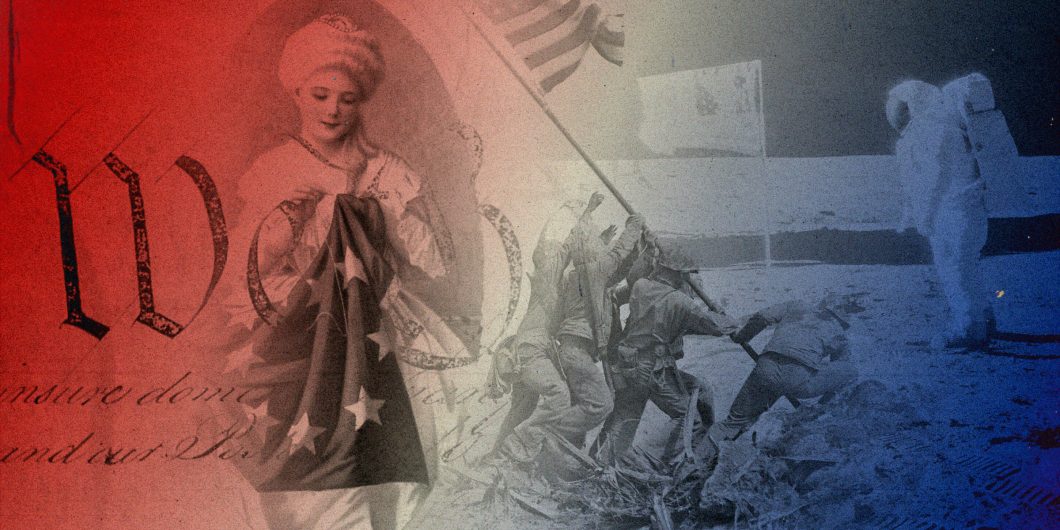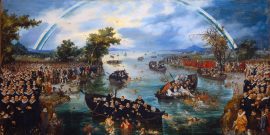Dirck Coornhert's 1582 Synod on the Freedom of Conscience speaks to our polarized age.
An American Story—But How?
In November 1938, in the wake of the Anschluss and the Munich Pact, Harvard English professor Howard Mumford Jones doubted democracy’s capacity to fight totalitarianism unarmed with the zealous patriotism of old-school Americanism. The title of his Atlantic Monthly essay that month asked “Patriotism—But How?” Provocatively, Jones claimed to envy the dictators’ virtuoso ability to unify and inspire the masses with national stories glittering with “glamour.” Fascism, Nazism, and Stalinism had their “grand operas,” why not America? The nation had once reared its young on tales of heroes, chivalry, and romance, but those epics had been “debunked” by the cynical and “iconoclastic” 1920s. Jones blamed “‘progressive’ educators, the debunking biographers, and social historians.” “I knew my American mythology before I knew its historical corrective,” Jones recalled. The Saginaw, Michigan, native was not afraid to defend the Gilded Age’s Appleton’s Fifth Reader, the histories of William Gilmore Simms, and the “immortal McGuffey.”
Jones’s wit and irony make it difficult to know if he meant all of his paean to America’s gods to be taken seriously, but his ultimate recommendation was unmistakable. For Jones, the only way to fight ideology was with ideology. “Inasmuch as the vaunted conflict among ideologies threatens to be won by the nation with the greatest belief in its own mythology, I wonder, now that scientific historians have destroyed most of the American myth, what it is that American democrats are to believe in during the coming struggle.” “Grey abstractions” wouldn’t get the job done. While American children were fed statistics and banal advice about responsible pet care in their schoolbooks, “in Germany, Italy, and Russia the manufacture of heroes has gone steadily forward. There is no use in saying they are fake heroes. The only way to conquer an alien mythology is to have a better mythology of your own.”
These sorts of proposals raised eyebrows. One critic found Jones vulnerable to a kind of democratic fascism he claimed to eschew. Was it true that America needed to fight ideology with ideology? Was it so that it didn’t matter if it was true or false just so we really, really believed in it? Was ideology the only way for America to fight in World War I? To wage World War II, the Cold War, and the War on Terror? There has been a strand of conservatism in America that has always resisted such claims. They have rarely been thanked for their opposition. Neoconservatives in the Bush II administration never tired of saying that the War on Terror was “the great ideological struggle of our time,” and filled the president’s speeches with the words “ideology” and “ideological.” A word search at the National Archives’ George W. Bush White House page yields over 2,000 hits. There are always those in power who want to keep projecting ideology on the cave wall to keep the prisoners distracted with the nationalist shadow show.
It is not Bill McClay’s fault that Jones and neocons came to mind as I read his essay. By this point, he might be worried that I am going to drag him into my indictment of ideologues. But that is far from the case. I found McClay’s essay on America’s story to be thought-provoking in the most literal sense. As I read and reread it, I felt like I could write a whole book in response. McClay offers something more nuanced and modest than anything cooked up by Jones and company. McClay is right that Americans’ sense of belonging to a community is in jeopardy. A new grand narrative of racism, violence, and exploitation is rapidly taking over biographies, histories, school curricula, and museums. The proposal by the National Archives’ “Internal Task Force on Racism” to “reimagine” the rotunda at their facility has to be seen to be believed. This narrative, masquerading as anti-narrative, is becoming the new orthodoxy. It occupies the seats of power, and is well-funded, aggressive, and righteous.
I think there is some risk that we will over-react, however. It would be a mistake to fight ideology with ideology, at least if conservatives care about being conservative. It will not do to construct curricula that replace one set of grey abstractions with another. Our task is to cultivate free and responsible human beings and not contented cavemen who sing the right songs and say the right pledges on cue.
I don’t expect of my country more than it can provide, or ought even to try to provide. I don’t look to the City of Man to give me transcendence or to tell me the meaning of life.
But McClay is never so shallow. He makes room for the truth about America’s failings. His task is not to “erase the memory of imperfect men and women in the past.” He calls the story he affirms “aspirational.” At its core lie the nation’s unprecedented achievement in self-government and the promise of a “second chance” offered to free individuals. And McClay warns that “the American story cannot survive . . . a loss of aspirational faith, the faith that is at the center of the story itself.”
The thought that nags at me is that America has always wrestled with competing stories, some homegrown, some thrust upon us, some low-voltage, and some what we might call “super-aspirational.” In the 1770s and 80s, there were French philosophes and their American sympathizers who wanted the United States to join France as the world’s second ideological nation. They were disappointed like jilted lovers when the US let them down by being too stubbornly, provincially British. There were crusaders in the House and Senate in the 1820s who wanted the United States to intervene in Latin America and in the Greek War for Independence in a global crusade for liberty. By the 1830s, some new Englanders began claiming that America was an “Idea,” and by implication that only one idea was the real idea. Some in the 1840s and 50s called for sending armed assistance to Hungary. Others discovered in the South an indigenous autocracy, our own despotic Austria that had to be pushed on its way down the losing side of history, joining all the fading Old World tyrannies.
But this national self-conception of America as the guarantor of freedom was held in check for generations by what I have called the “old exceptionalism”—dedication to perfecting American institutions at home, keeping your house in order, cherishing the rule of law, frugality, modesty, and a constitutionalism that understood there are things a republic can never do and still remain a republic. We were not all proto-Wilsonians just waiting for the right opportunity to come along to make the world safe for democracy in humanity’s final war for liberty.
My point is that America has never had a single, unified story. It may have had a dominant story, or a succession of dominant stories, but those have changed over time and they have willingly or unwillingly been made to wrestle with competing stories. It may be, as McClay concedes, that these are variations on one story, but I don’t know if I am as confident. I hope McClay is right. And I am sure he would agree with me that we don’t need to revive and perpetuate American stories that were nothing less than ersatz stories of redemption that confused the callings of church and government and mobilized the City of Man as if it were the City of God to stand at Armageddon and battle for the Lord. No doubt I have spent too much time over the past 30 years as a “myth-buster.” I have tried to unmask the pretensions of messianic Wilsonianism, America’s (mis)appropriation of the “city on a hill,” and the immanentized eschatology of “The Battle Hymn of the Republic.” I get cranky when I sense that I’m having a story pushed on me by academia, the press, corporations, or the government. As a Christian, I don’t expect of my country more than it can provide, or ought even to try to provide. I don’t look to the City of Man to give me transcendence or to tell me the meaning of life. But all that being true, the challenge in the classroom is how to show students the dangers of super-aspirational stories without turning them into cynical, amateur debunkers. Now more than ever, they need a sense of belonging to a people, a place, and a way of life. And more than a sense, they need the experience.

